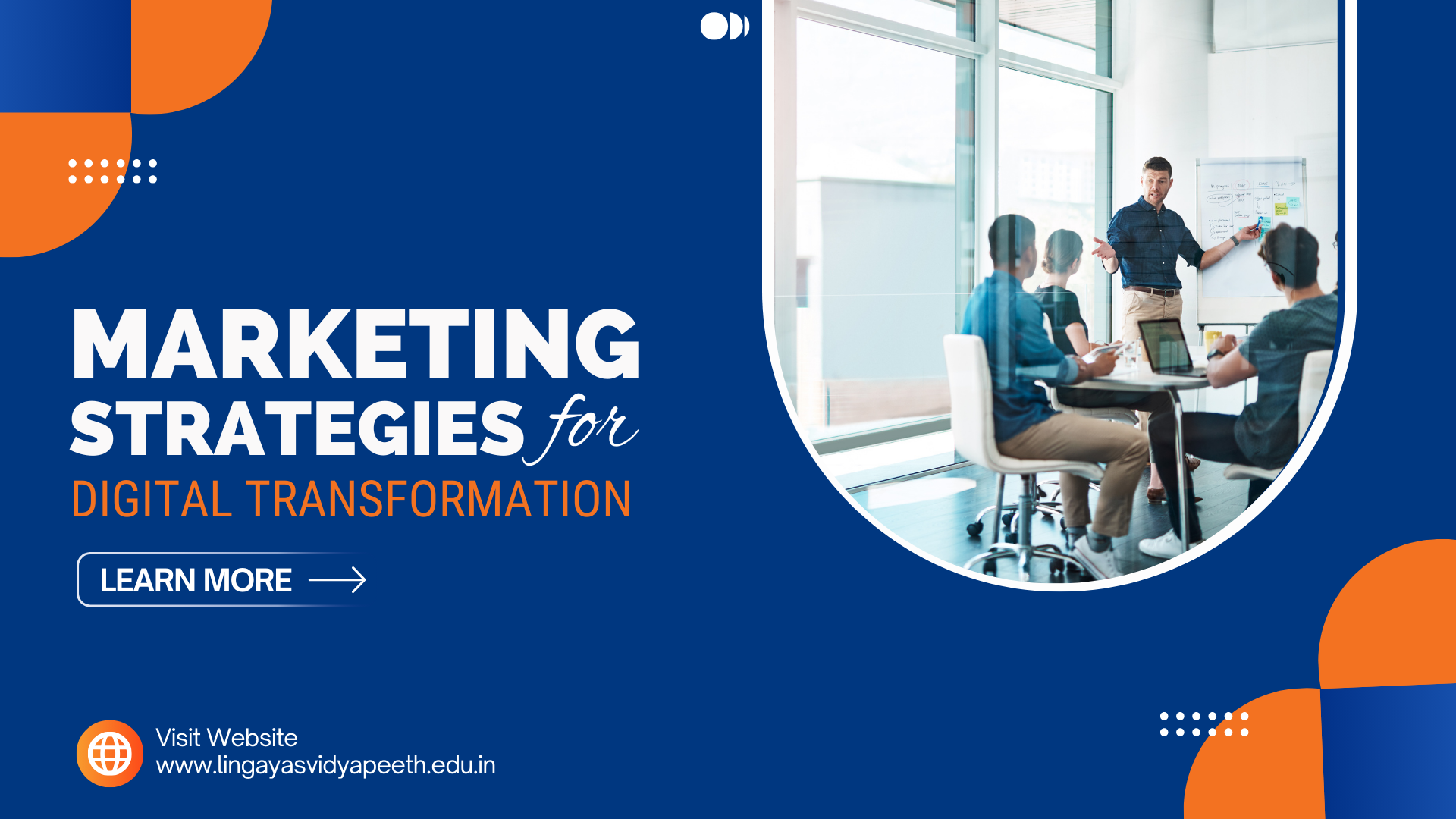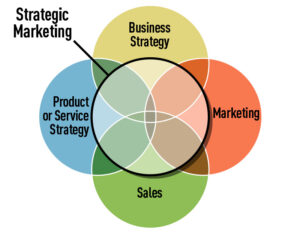Home » Strategic Marketing in the Era of Digital Transformation: Opportunities and Challenges

In the dynamic landscape of the 21st century, digital transformation has revolutionized nearly every aspect of business, including marketing. As organizations increasingly shift their focus to digital platforms, the strategies they use to engage customers, build brands, and drive growth must also evolve. Strategic marketing, when effectively aligned with digital transformation, offers unparalleled opportunities for businesses to thrive. However, it also presents a unique set of challenges that must be navigated carefully.
This blog explores the opportunities and challenges of strategic marketing in the age of digital transformation, providing insights for students and professionals alike.
Digital transformation refers to the integration of digital technologies into all areas of business, fundamentally changing how companies operate and deliver value to customers. In marketing, this transformation has led to the emergence of new channels, tools, and techniques that enable more targeted, personalized, and efficient customer engagement. However, the rapid pace of technological change also means that marketers must constantly adapt to stay relevant.

One of the most significant benefits of digital transformation is the ability to collect and analyze vast amounts of customer data. Advanced analytics tools allow marketers to gain deep insights into customer behavior, preferences, and needs. This data-driven approach enables more precise targeting, personalized content, and effective campaigns, ultimately leading to higher conversion rates and customer satisfaction.
Digital transformation has enabled businesses to engage with customers across multiple touchpoints, including social media, email, mobile apps, and websites. An omnichannel strategy ensures a seamless and consistent customer experience across all these channels. By integrating online and offline efforts, businesses can build stronger relationships with their audience and drive more significant results.
The rise of digital platforms has made content marketing a central component of strategic marketing. High-quality, relevant content can attract, engage, and retain customers while establishing a brand’s authority in the market. Social media platforms offer a powerful way to distribute this content, interact with customers, and build communities around a brand. Leveraging these platforms effectively can amplify a brand’s reach and influence.
Marketing automation tools and artificial intelligence (AI) have transformed how campaigns are managed and executed. From automated email marketing and social media scheduling to AI-driven customer segmentation and predictive analytics, these technologies save time, reduce costs, and enhance campaign effectiveness. By automating routine tasks, marketers can focus on more strategic initiatives that drive growth.
Digital transformation has broken down geographical barriers, allowing businesses to reach global audiences with relative ease. Digital marketing campaigns can be scaled quickly and efficiently, reaching potential customers across different regions and languages. This global reach opens up new markets and opportunities for growth, especially for businesses with innovative products or services.
As businesses collect more customer data, concerns about privacy and data security have intensified. With regulations like the General Data Protection Regulation (GDPR) in the European Union and the California Consumer Privacy Act (CCPA) in the United States, marketers must ensure they comply with legal requirements while maintaining customer trust. Balancing data-driven marketing with ethical considerations is a critical challenge in the digital age.
Used Dark Data for Strategic Business Decisions
The speed at which digital technologies evolve presents a significant challenge for marketers. New tools, platforms, and algorithms emerge regularly, requiring marketers to continually update their skills and strategies. Staying ahead of these changes demands continuous learning and agility, making it essential for marketing teams to be adaptable and proactive.
Digital transformation has raised customer expectations for personalization, speed, and convenience. Today’s customers expect seamless experiences across all touchpoints, and they are quick to switch brands if their expectations are not met. Meeting these expectations requires a deep understanding of customer journeys and the ability to deliver consistent, high-quality interactions at every stage.
While digital marketing offers numerous advantages, traditional marketing methods like print, television, and direct mail still play a role in many industries. Integrating digital and traditional marketing efforts into a cohesive strategy can be challenging, especially when trying to measure the effectiveness of each channel. Marketers must find the right balance and ensure that all efforts contribute to a unified brand message.
Digital marketing often requires significant investment in technology, tools, and talent. Allocating resources effectively while maximizing return on investment (ROI) can be challenging, especially for small businesses or those with limited budgets. Marketers must prioritize initiatives that offer the most significant potential impact while being mindful of costs.
Strategic marketing in the age of digital transformation presents both exciting opportunities and complex challenges. The ability to leverage data, automation, and digital platforms offers unparalleled potential for growth and customer engagement. However, to fully capitalize on these opportunities, marketers must navigate issues related to data privacy, technological change, and resource allocation.
Business Research Methods: Tools and Techniques for Effective Decision-Making
For management students and professionals, understanding these dynamics is crucial for success in today’s fast-paced business environment. By staying informed about the latest trends and technologies, and by being adaptable and customer-focused, marketers can develop strategies that not only meet current demands but also anticipate future needs.
As businesses continue to evolve in response to digital transformation, the role of strategic marketing will only become more critical. Those who can effectively integrate digital tools and strategies into their marketing efforts will be well-positioned to lead their organizations to success in the digital age.
Written by
Shivangi Priya
Assistant Professor
School of Commerce and Management
Lingaya’s Vidyapeeth
Best MBA Colleges in Delhi NCR
RECENT POSTS
CATEGORIES
TAGS
Agriculture Agriculture future AI Architecture artificial intelligence Bachelor of Commerce BA English BA Psychology BTech AIML BTech CSE BTech cybersecurity BTech Engineering Business management career Career-Specific Education career guide career option career scope Civil engineering commerce and management Computer Science Computer science engineering Data science degree education Engineering Engineering students English Literature english program Fashion Design Fashion design course Higher Education Journalism journalism and mass communication law Law career Machine Learning mathematics MBA MBA specialization Mechanical Engineering Pharmacy Psychology Research and Development students
Nachauli, Jasana Road, Faridabad, Haryana
Address: C-72, Second Floor, Shivalik, Near Malviya Nagar,
Above HDFC Bank, New Delhi 110017
Landline No. - 011-46570515 / 45138169 / 41755703
Mobile No. - +91-7303152412 / +91-7303152420 / +91-9311321952
Toll Free: 1800-120-4613
Mobile : 8447744303 | 8447744304 | 8447744306 | 8447744309
8700003974 | 8700003411 | 8700003749
Copyrights © 1998 - 2025 Lingaya's Vidyapeeth (Deemed To Be University). All rights reserved.
LV only conducts physical/online verification of any document related to examination on the following email id:
It is important to note that the following email IDs and domains are fraudulent and do not belong to our university.